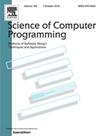Evaluating a continuous feedback strategy to enhance machine learning code smell detection
IF 1.4
4区 计算机科学
Q3 COMPUTER SCIENCE, SOFTWARE ENGINEERING
引用次数: 0
Abstract
Code smells are symptoms of bad design choices implemented on the source code. Several code smell detection tools and strategies have been proposed over the years, including the use of machine learning algorithms. However, we lack empirical evidence on how expert feedback could improve machine learning based detection of code smells. This paper aims to propose and evaluate a conceptual strategy to improve machine-learning detection of code smells by means of continuous feedback. To evaluate the strategy, we follow an exploratory evaluation design to compare results of the smell detection before and after feedback provided by a service - acting as a software expert. We focus on four code smells - God Class, Long Method, Feature Envy, and Refused Bequest - detected in 20 Java systems. As results, we observed that continuous feedback improves the performance of code smell detection. For the detection of the class-level code smells, God Class and Refused Bequest, we achieved an average improvement in terms of F1 of 0.13 and 0.58, respectively, after 50 iterations of feedback. For the method-level code smells, Long Method and Feature Envy, the improvements of F1 were 0.66 and 0.72, respectively. Our promising results are a stepping stone towards the development of new strategies and tools relying on continuous feedback for machine learning detection of code smells.
评估持续反馈策略以增强机器学习代码气味检测
代码异味是在源代码上实现的错误设计选择的症状。多年来,已经提出了几种代码气味检测工具和策略,包括使用机器学习算法。然而,我们缺乏关于专家反馈如何改善基于机器学习的代码气味检测的经验证据。本文旨在提出并评估一种概念性策略,通过持续反馈来改进机器学习对代码气味的检测。为了评估策略,我们遵循探索性评估设计,以比较服务(作为软件专家)提供反馈之前和之后的气味检测结果。我们专注于在20个Java系统中检测到的四种代码气味——God Class、Long Method、Feature Envy和Refused Bequest。结果,我们观察到持续反馈提高了代码气味检测的性能。对于类级代码气味、God Class和Refused Bequest的检测,经过50次反馈迭代,我们在F1方面的平均改进分别为0.13和0.58。对于方法级代码气味、长方法和特征羡慕,F1的改进分别为0.66和0.72。我们有希望的结果是开发新策略和工具的垫脚石,这些策略和工具依赖于机器学习检测代码气味的持续反馈。
本文章由计算机程序翻译,如有差异,请以英文原文为准。
求助全文
约1分钟内获得全文
求助全文
来源期刊

Science of Computer Programming
工程技术-计算机:软件工程
CiteScore
3.80
自引率
0.00%
发文量
76
审稿时长
67 days
期刊介绍:
Science of Computer Programming is dedicated to the distribution of research results in the areas of software systems development, use and maintenance, including the software aspects of hardware design.
The journal has a wide scope ranging from the many facets of methodological foundations to the details of technical issues andthe aspects of industrial practice.
The subjects of interest to SCP cover the entire spectrum of methods for the entire life cycle of software systems, including
• Requirements, specification, design, validation, verification, coding, testing, maintenance, metrics and renovation of software;
• Design, implementation and evaluation of programming languages;
• Programming environments, development tools, visualisation and animation;
• Management of the development process;
• Human factors in software, software for social interaction, software for social computing;
• Cyber physical systems, and software for the interaction between the physical and the machine;
• Software aspects of infrastructure services, system administration, and network management.
 求助内容:
求助内容: 应助结果提醒方式:
应助结果提醒方式:


